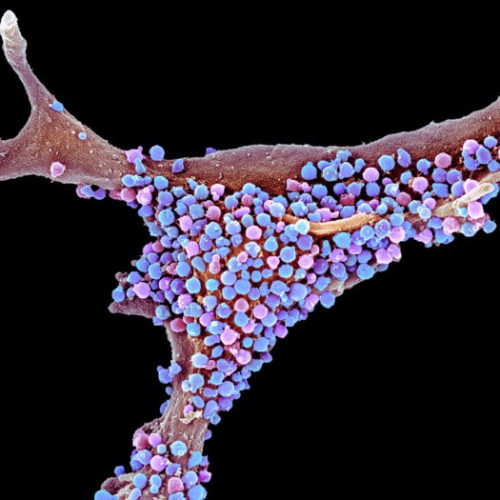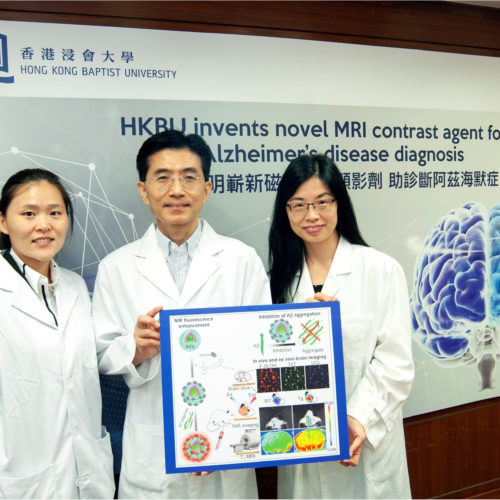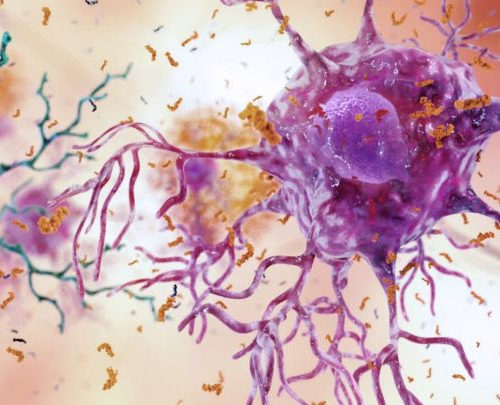A fringe theory links microbes in the brain with the onset of dementia. Now, researchers are taking it seriously. Alison Abbott Some scientists think that microbes such as the herpes simplex virus 1 (shown here on an epithelial cell) could trigger some cases of Alzheimer’s disease. Two years ago, immunologist and medical-publishing entrepreneur Leslie Norins offered to...
Tag: <span>Alzheimer’s disease</span>
New method shows great potential for the treatment of Alzheimer’s disease
UPPSALA UNIVERSITY IMAGE: IN ALZHEIMER’S DISEASE, A PROTEIN (PEPTIDE) FORMS CLUMPS IN THE BRAIN AND CAUSES SUFFERERS TO LOSE THEIR MEMORY. IN A RECENTLY PUBLISHED ARTICLE, A RESEARCH GROUP AT UPPSALA UNIVERSITY DESCRIBED. In Alzheimer’s disease, a protein (peptide) forms clumps in the brain and causes sufferers to lose their memory. In a recently published...
Novel MRI contrast agent offers hope for early detection of Alzheimer’s disease
Nov 2 2020 Hong Kong Baptist University (HKBU) scientists have invented a novel contrast agent for magnetic resonance imaging (MRI), which enables real-time visualization and detection of the size and number of amyloid-beta in the brain, a main hallmark of Alzheimer’s disease (AD). The invention offers hope for early detection and large-scale routine screening of...
Common Class of Drugs Linked to Increased Risk of Alzheimer’s Disease
A team of scientists, led by researchers at University of California San Diego School of Medicine, report that a class of drugs used for a broad array of conditions, from allergies and colds to hypertension and urinary incontinence, may be associated with an increased risk of cognitive decline, particularly in older adults at greater risk for Alzheimer’s...
A genetic variant that protects against Alzheimer’s disease promotes immune cell functions
UNIVERSITY OF EASTERN FINLAND A new study conducted by researchers at the University of Eastern Finland found that the PLCG2-P522R genetic variant, which protects against Alzheimer’s disease, enhances several key functions of immune cells. The results obtained in the study highlight the importance of immune cells as a target of future development of new therapies for Alzheimer’s...
Common class of drugs linked to increased risk of Alzheimer’s disease
Anticholinergic medications are used for many conditions but might also accelerate cognitive decline, especially in older persons with biological or genetic risk factors UNIVERSITY OF CALIFORNIA – SAN DIEGO A team of scientists, led by researchers at University of California San Diego School of Medicine, report that a class of drugs used for a broad...
People with increased risk of Alzheimer’s have deficits in navigating
by Ruhr-Universitaet-Bochum Animals and humans have the ability to follow their own position in space through self-motion cues, even in the absence of any other sensory information. “If you get up at night and want to find your way to the bathroom in the dark, you need—in addition to knowing the arrangement of your own...
MSK study links inflammation to Alzheimer’s disease development
MEMORIAL SLOAN KETTERING CANCER CENTER Alzheimer’s disease is a neurodegenerative condition that is characterized by the buildup of clumps of beta-amyloid protein in the brain. Exactly what causes these clumps, known as plaques, and what role they play in disease progression is an active area of research important for developing prevention and treatment strategies. Recent...
Study targets gene associated with Alzheimer’s disease
by Bob Shepard, University of Alabama at Birmingham The neurons in this image are stained blue, indicating the presence of the BIN1 protein. Points of direct interaction between BIN1 and calcium channels are in purple. Credit: University of Alabama at Birmingham Researchers at the University of Alabama at Birmingham are on the track of a...
Study examines the side effects of Alzheimer’s disease dementia drugs
Reviewed by Emily Henderson, B.Sc.Sep 3 2020 In a first of its kind study, a University of Houston researcher is examining two common drugs used for dementia in patients with Alzheimer’s disease to determine the extent to which they don’t mix well together and cause a cascading event of side effects, prompting the need for...






